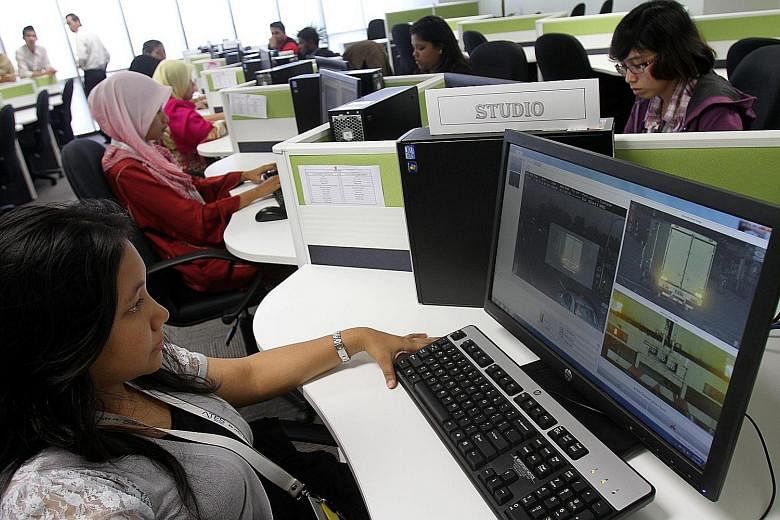Having lost RM14 billion (S$4.9 billion) in oil revenue last year due to the free fall in oil prices, Malaysia's administration is planning to boost its coffers with several new measures that would eventually hit the pockets of consumers.
With a further drop of up to RM10 billion in petro-dollars expected this year, the government has already hiked the "sin taxes" for alcohol and tobacco. It now plans to introduce new commercial fees for phone companies and airlines, as well as revive an unpopular traffic summons system.
Malaysia has committed itself to reducing overspending by keeping public debt in check, with a 3.1 per cent budget deficit projected for this year.
But the 3.1 per cent target appears to be in danger of being breached as, according to central bank figures, the first two months of the year saw an unprecedented RM16 billion fiscal deficit, mostly due to dwindling income. The combined government revenue of RM28 billion is the lowest for a two-month period in five years.
One of the measures to raise revenues is a new billion-ringgit charge for the use of radio spectrum by telecoms companies. This was unveiled by Prime Minister Najib Razak when he announced a review of Budget 2016 in January.
Meanwhile, the Department of Civil Aviation (DCA) has begun discussions with airlines about raising aviation charges for things such as the use of Malaysian airspace and air traffic facilities and the cost of getting an air operator's certificate and the pilot's flight licence.
-
3 measures to boost govt revenues
-
• Relooking telecoms spectrum allocation in January. The market sees telecom service providers paying a total of RM4 billion (S$1.4 billion) for an initial 15-year licence. About a quarter of the amount is expected to be collected upfront.
• The Department of Civil Aviation is proposing a 10-fold hike in fees for airlines, worth about RM500 million. It needs to finance annual operation costs of RM250 million. After negotiations, final fees will likely see an increase of 100 per cent instead.
• Reviving the Automated Enforcement System that uses cameras against traffic offenders. Under the AES, RM500 million in traffic summonses were issued over a two-year period using just 14 cameras. The government wants to install 1,200 new cameras after passing legal amendments.
The DCA said the fee jump is reasonable as it has not raised fees for 40 years.
A third unpopular measure is the reintroduction of the lucrative Automated Enforcement System (AES) for traffic offences, with more cameras installed to snap pictures of motorists who break the law.
There has been a public uproar over these government plans as the higher fees are likely to be passed on to phone users, air travellers and car drivers. Businesses would similarly be hit.
The public unhappiness adds to the seething anger over the government's introduction of the 6 per cent goods and services tax (GST) last year, which has led to spiralling food and service costs.
AmBank chief economist Anthony Dass said it was "premature" to say the worst was over with regard to the weak business sentiment after a tumultuous time last year, when prices of almost everything went up due to the GST.
He expects business sentiment to "thoroughly bottom out" only by the end of the third or fourth quarter, and sees consumer sentiment being similarly weak till then.
When the government jacked up excise duty for cigarettes by 40 per cent last November, Malaysia's biggest cigarette manufacturer, British American Tobacco, announced it would close its local plant by next year.
The public is particularly angry with the plan to reboot the AES, as just last year, tolls were raised on highways around Greater Kuala Lumpur.
Datuk Seri Najib is facing a public backlash over what is seen as mismanagement of the economy, which is said to be the top reason for the growing disquiet.
In a survey by respected pollster Merdeka Centre at the end of last year, only 23 per cent of Malaysians said they were happy with the government.
Nomura's South-east Asia economist Euben Paracuelles believes that ultimately, the government is only "implementing revenue mobilisation measures at the margins".
Mr Wan Saiful Wan Jan, chief of policy think-tank Ideas, said the government must make clear structural changes to reduce unnecessary public spending, such as reducing the size of the bloated 1.6 million-strong civil service, whose wages take up a third of operating expenses.
"There is a clear need to cut the size of government but it will be politically unpopular," he said.

